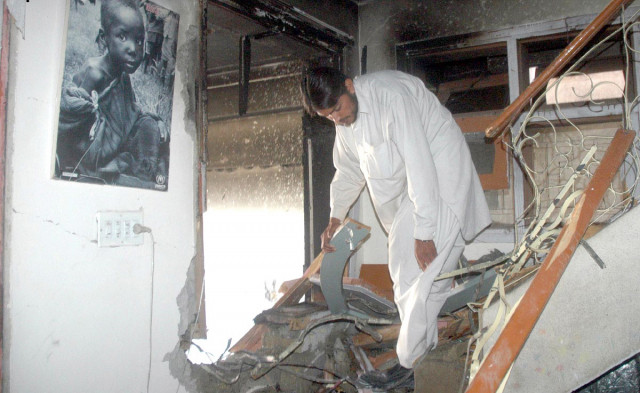‘Get your act together, Quetta’
Economists and policy experts call on provincial govt to improve law enforcement, revenue collection.

Balochistan’s economists and government officials agree: the province must focus on improving its revenue collection and better law enforcement if it is to have a chance at attracting foreign investment into the lucrative mining sector.
At a seminar organised at the Quetta Press Club on Saturday, economists, tax experts, academics and government officials analysed the proposed Balochistan budget for the fiscal year ending June 30, 2012 and made several recommendations on how to improve the government’s delivery of services to people and businesses.
Central to the discussion was the deteriorating law and order situation, which, experts agreed, was the single biggest deterrence to the economic progress of a province richly endowed with mineral resources.
“The next budget focuses on economic zones along with law and order, as without maintaining peace, no investors will come forward to put money in the province,” said Hafiz Abdul Majid, an additional finance secretary in the Balochistan government.
The outside experts and government officials both agreed that Balochistan needs to dramatically improve its infrastructure, in education, healthcare and transportation, in order to improve the province’s economic prospects. However, one of the biggest hindrances identified was the lack of fiscal space to do so.
“The Balochistan budget for 2012 has no taxes because the province has nothing to tax,” said Dr Arif Shah, an economist based in Quetta. “Our budget is even smaller than the endowments of medium-sized universities in the United States.”
Yet the problem is at least partially due to the Quetta’s inability to marshal its own resources. “Only 17 per cent of the vehicles in the province are registered in Balochistan. The rest are registered, and pay taxes in, other provinces,” said Kamal H Siddiqui, a tax expert.
Siddiqui pointed out that the provincial government had not updated its property tax laws since 1958, which means that its tax levies have not been adjusted for decades worth of inflation. The 20-year average for inflation in Pakistan, according to data from the central bank, is over 9 per cent.
The provincial government achieved its revenue collection of Rs4.5 billion for the outgoing fiscal year and anticipates being able to collect more than Rs6 billion for the upcoming fiscal year.
These meagre revenue collections make Balochistan heavily dependent upon the federal government’s largesse. Yet Islamabad is not always willing, able or interested enough in obliging Quetta’s fiscal needs. On Friday, the Balochistan finance minister walked out of the annual planning coordination committee meeting in Islamabad in protest against the reductions and delays in federal funding for the province.
Even when the government is able to secure the funding its requests, its poor implementation capabilities often result in abysmal delivery of service to the citizens of the province.
“We usually earmark huge amounts of money for the health sector, but due to poor implementation of government policies, the province has an infant mortality rate of 150 children per 1,000 live births,” said Arif Shah, a professor at the University of Balochistan.
The net effect of all of the poor implementation of government policy is that, despite having over 50 per cent of the country’s mineral resources, Balochistan accounts for less than 1.5 per cent of the country’s total economic output.
The provincial government seems keen to increase its allocations towards health and agriculture, having expanded the budgets of those departments by 364 and 100 per cent respectively. Quetta has also allocated Rs17.3 billion towards education.
Published in The Express Tribune, May 15th, 2011.












1724319076-0/Untitled-design-(5)1724319076-0-208x130.webp)






COMMENTS
Comments are moderated and generally will be posted if they are on-topic and not abusive.
For more information, please see our Comments FAQ